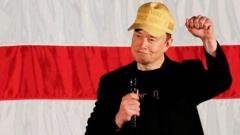Tech billionaire Elon Musk has announced a controversial initiative where he will distribute $1 million per day to registered voters in key swing states until the November 5 U.S. presidential election. The winners will be selected randomly from those who sign a petition affirming support for the U.S. Constitution, a campaign effort coordinated through Musk’s newly formed group, AmericaPAC, which is known for backing Republican nominee Donald Trump.
During a recent town hall event in Pennsylvania, Musk handed out the first checks of this lottery-style giveaway, which were met with both surprise and skepticism. Democratic Pennsylvania Governor Josh Shapiro criticized Musk's efforts, characterizing them as "deeply concerning" and suggesting that authorities should investigate the legality of such payments.
The contest is limited to voters in several battleground states, including Pennsylvania, Georgia, Nevada, Arizona, Michigan, Wisconsin, and North Carolina. Legal experts have raised alarms regarding the legality of the initiative. Election law specialist Rick Hasen contended that Musk's offer likely violates federal law, which prohibits any payment or incentive offered to influence voter registration or casting a vote. Musk’s strategy requires petition signers to be registered voters from these states, which has led many to question the intent and legality behind the program.
While Musk claims the initiative is a means to gather voter data in support of freedom of speech and gun rights, critics argue that it introduces financial influence into the election process that could skew voter representation. In Pennsylvania, Musk offers $100 for signing the petition along with additional funds for referrals, while voters in other crucial states receive $47 per referral.
Despite the potential legal ramifications, Musk's strategy may exploit a loophole in U.S. election law; although payments are being offered, they are not explicitly contingent on whether individuals vote. Historical precedents, such as ice cream giveaways on election day, highlight the complex legal landscape regarding incentives tied to voting.
Trump, who has maintained a friendly rapport with Musk, was asked about the giveaway during a campaign event but stated that he had not closely followed the initiative. AmericaPAC, which Musk founded in July, is poised to play a crucial role in Trump’s election strategy, after Musk reportedly donated around $75 million to support the group's activities. AmericaPAC aims to rally voters around key issues, including border security and the rights to free speech and self-protection.
With Musk at the forefront of this high-stakes electoral gamble as the wealthiest person in the world, his financial backing for both Trump and AmericaPAC raises pressing questions about the intertwining of wealth and political influence in the U.S. electoral process. He aims to enlist millions of supporters for a cause that he believes sends an essential message to elected officials about the importance of constitutional freedoms.



















